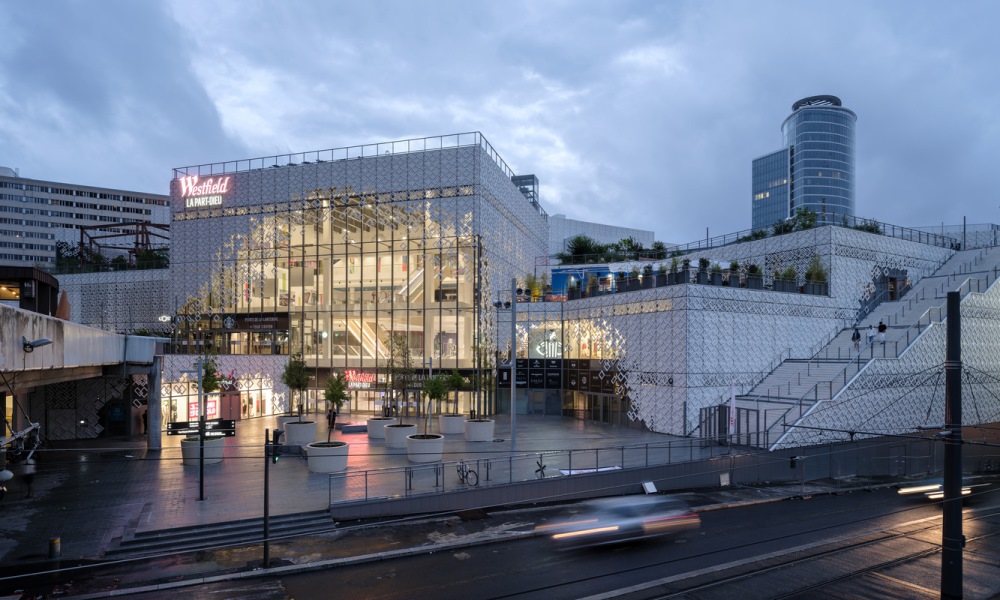In Lyon, France, the Rotterdam-based design and redevelopment firm MVRDV has just completed the transformation of the La Part-Dieu urban shopping center.
A building that was once an obstruction to Lyon’s vitality is poised to begin a new chapter as a vibrant city center attraction
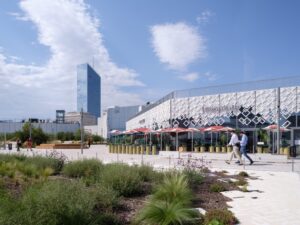 The project has transformed the original building from the 1970s, “re-socializing” the shopping centre and transforming Lyon’s city centre.
The project has transformed the original building from the 1970s, “re-socializing” the shopping centre and transforming Lyon’s city centre.
Designed in an era when cars ruled city planning, the original design of La Part-Dieu was an introverted behemoth. It was among the largest urban shopping centers in Europe, yet had little connection to the streets around it.
While sustainably reusing a significant amount of the existing building’s materials, the design rearranges internal programs, adds more space, replaces a redundant parking garage, inserts large windows, refreshes the characteristic old concrete façade, and adds an expansive rooftop park connected to the city by monumental stairs.
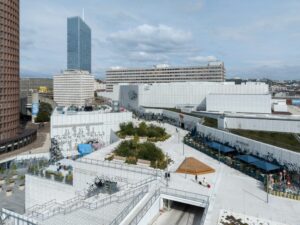 Despite the dramatic transformation, the design retains the history of the building.
Despite the dramatic transformation, the design retains the history of the building.
The concrete panels that composed the distinctive original façade have been preserved and reused in line with circular economy principles, retaining the pattern of interlocking rectangles that characterized the original building’s striking visual identity.
These concrete panels, which previously were a dull beige, are now fresh and white. They are also replicated on the extensions, with a modern twist; at the entrances and other key locations, the façade ‘evaporates’ to reveal large windows, reinforcing the building’s openness, creating a physical and symbolic gesture heralding the gateway to a revitalized Lyon Part-Dieu.
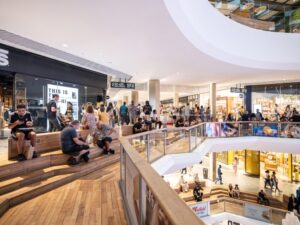 The transformation replaces the old parking garage and rearranges the building’s interior spaces to rationalize circulation, while new extensions also add an extra 32,000 square meters of leasable space to the existing 130,000 square meters.
The transformation replaces the old parking garage and rearranges the building’s interior spaces to rationalize circulation, while new extensions also add an extra 32,000 square meters of leasable space to the existing 130,000 square meters.
“The joy of this new façade is the many different things people think of when they see it,” says MVRDV founding partner Winy Maas.
“Perhaps it’s fabric lace, and the edges have burned off; maybe it’s sugar that has dissolved; it could be snowflakes, and they are beginning to melt. All of these evocative images are in stark contrast to the heavy, unfriendly mass that characterised the building before. It turns the old monster into a gracious Grande Dame,” he added.
Another significant element of the transformation is found on the roof: grand staircases rise next to the shopping center’s main entrances, leading to a multi-level rooftop garden that connects three sides of the building.
 With restaurants and cafés as well as green spaces, comfortable seating, and play areas for children, this rooftop and terraces become a true piece of the city, connecting parts of the city—including the city’s main Part-Dieu train station—that were previously detached from one another.
With restaurants and cafés as well as green spaces, comfortable seating, and play areas for children, this rooftop and terraces become a true piece of the city, connecting parts of the city—including the city’s main Part-Dieu train station—that were previously detached from one another.
“When we can shop online from the comfort of our sofas, a shopping centre – especially one in the middle of the city – needs to offer a complete experience, with shopping complemented by a variety of leisure activities,” continued Maas.
“Lyon Part-Dieu is now more porous and contemporary, permeated by daily life. From its green public roof garden, you can relax, meet people, take in the views, and find solace away from the bustling streets below,” he concluded.
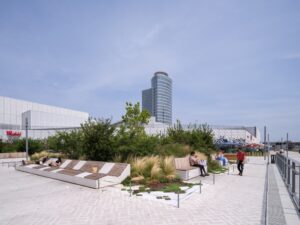 People can now take multiple routes through or over the building to cross the vast site; the shopping centre becomes a kind of public plateau, a vantage point that allows people to orient themselves within the city.
People can now take multiple routes through or over the building to cross the vast site; the shopping centre becomes a kind of public plateau, a vantage point that allows people to orient themselves within the city.
“Lyon Part-Dieu is a place that we wanted to reinvent,” explained Jean-Philippe Pelou, Director of the Westfield La Part-Dieu centre. “Much more than a shopping mall, it is a mixed-use place to live together, in the heart of the city.”
The transformation of Lyon Part-Dieu shows how the urban mistakes of previous eras can be sustainably assimilated and redeveloped into the modern city.
Rather than demolish and build anew an area that is the equivalent of around 12 city blocks, the design retains the existing structure, including much of its façade, and avoids the significant amounts of embodied carbon that rebuilding would otherwise create.
All images courtesy of MVRDV.

